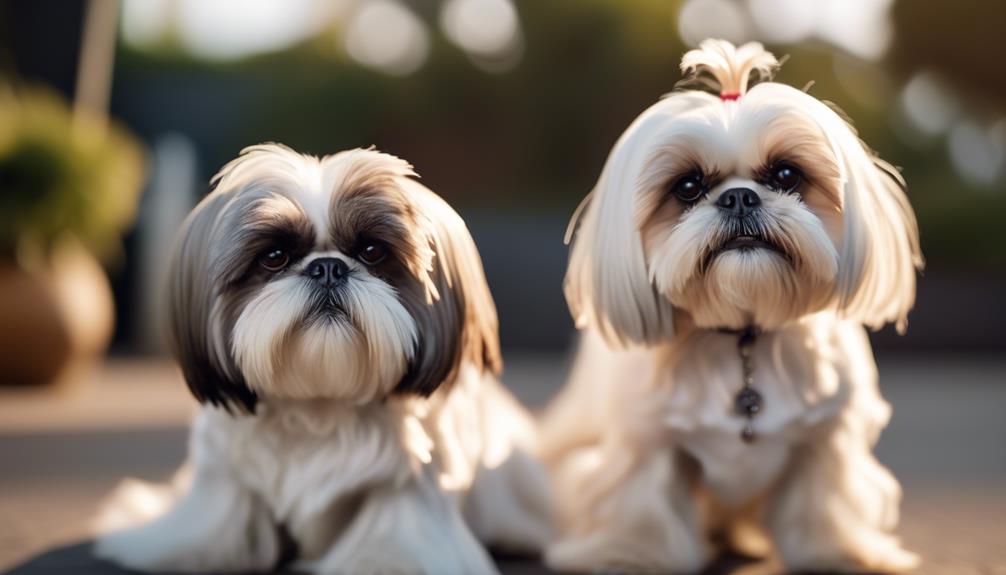When to Opt for a Shih Tzu or Maltese for Companion Dogs

Factors to consider when choosing between a Shih Tzu and a Maltese for a companion dog include:
- Size: Shih Tzus are generally slightly larger than Maltese dogs. Shih Tzus typically weigh between 9-16 pounds, while Maltese dogs usually weigh between 4-7 pounds. If you prefer a smaller dog, a Maltese may be a better choice.
- Temperament: Both Shih Tzus and Maltese dogs are known for their friendly and affectionate nature. However, Shih Tzus can sometimes be more independent and stubborn, while Maltese dogs tend to be more sensitive and eager to please. Consider which temperament traits align with your lifestyle and preferences.
- Grooming Needs: Both breeds have long, silky coats that require regular grooming to prevent matting and keep the fur clean and healthy. However, Shih Tzus have a thicker coat that may require more frequent brushing and professional grooming. Maltese dogs have a single-layered coat that may be slightly easier to maintain.
- Activity Level: Shih Tzus and Maltese dogs are both indoor dogs that do not require a lot of exercise. However, Shih Tzus are generally more energetic and may enjoy short walks and playtime more than Maltese dogs, who tend to be more laid-back and content with less physical activity.
Consider these factors carefully to determine which breed best fits your lifestyle and preferences.
Key Takeaways
- Size and appearance: Shih Tzus are generally larger and have a longer, more flowing coat, while Maltese dogs are smaller and have a smooth, silky coat.
- Temperament and personality: Shih Tzus can be more independent and stubborn, while Maltese dogs tend to be more sensitive and eager to please.
- Health considerations: Shih Tzus are prone to brachycephalic airway syndrome and eye problems, while Maltese dogs may experience dental issues and have a higher risk of luxating patella.
- Exercise and activity level: Shih Tzus are generally more energetic and may require more exercise, while Maltese dogs are more laid-back and have lower exercise requirements.
Appearance and Size
When considering the appearance and size of companion dogs, it's important to note that the Shih Tzu is slightly taller and larger in size compared to the Maltese. The Shih Tzu typically stands between 8 to 11 inches tall, while the Maltese is slightly shorter, ranging from 8 to 10 inches. In terms of weight, the Shih Tzu weighs between 9 to 16 lbs, while the Maltese weighs between 6.5 to 9 lbs. Therefore, the Shih Tzu is generally bigger and more robust compared to the Maltese.
In addition to their size, the Shih Tzu and Maltese also differ in their coat characteristics. The Shih Tzu has a long and flowing coat that's thick and doesn't drape like the Maltese. Their coat requires regular grooming to prevent matting and tangling. On the other hand, the Maltese has a smooth, silky, and feathery long coat that can be left long or trimmed short for easier maintenance.
When choosing between a Shih Tzu and a Maltese as companion dogs, it's important to consider their size and coat characteristics. The Shih Tzu's slightly taller and larger size may be more suitable for individuals who prefer a slightly bigger dog, while the Maltese's smaller size may be more appealing to those who prefer a more compact companion. Additionally, the maintenance required for their coats should also be taken into consideration.
Temperament and Personality

The Shih Tzu and Maltese have distinct temperaments and personalities that are important to consider when choosing a companion dog. Understanding these differences can help ensure a compatible match between the dog and its owner. Here are some key points to consider:
- Shih Tzu: They're known to be affectionate, happy, and outgoing. However, they can also be independent and stubborn. Without proper training, they may exhibit small dog syndrome, which can lead to behavioral issues.
- Maltese: These dogs are generally easygoing, docile, and sweet-tempered. They're also known to be adaptable and easier to train compared to Shih Tzus. They're extremely sociable and get along well with strangers, other dogs, and children.
When it comes to compatibility with other pets, Shih Tzus tend to get along well with other cats and dogs. However, they may not be as child-friendly as Maltese, who are known to be great with children.
Both breeds require daily grooming, but it's important to note that Shih Tzus have a thicker coat that requires regular professional grooming.
Considering these temperament and personality traits can help potential owners make an informed decision when choosing between a Shih Tzu and a Maltese as a companion dog.
Health Considerations

Moving on to the important aspect of health considerations, it's crucial to be aware of the specific health issues and potential lifespan of both the Shih Tzu and Maltese breeds when deciding on a companion dog. Each breed has its own set of health concerns that should be taken into account.
The Shih Tzu is prone to brachycephalic airway syndrome, which can cause breathing difficulties due to their short snouts. Additionally, they're susceptible to eye problems such as corneal ulcers and progressive retinal atrophy. Regular veterinary check-ups and proper care are essential to address these issues and ensure the well-being of the Shih Tzu.
On the other hand, the Maltese breed may experience dental issues, including tooth decay and gum disease. They're also known to have a higher risk of luxating patella, a condition where the kneecap dislocates. Regular dental care and monitoring for any signs of joint problems are important for maintaining the health of the Maltese.
When it comes to lifespan, the Shih Tzu typically lives between 10 to 16 years, while the Maltese has a lifespan of 12 to 15 years. It's important to consider the long-term health commitment when choosing between these breeds as companion dogs.
Understanding the breed-specific health issues and lifespans of Shih Tzu and Maltese is essential for making informed decisions about their care and well-being. By considering these health considerations, potential owners can ensure that they're equipped to provide the necessary care and attention for their chosen breed.
Exercise and Activity Level

To ensure the overall health and well-being of both the Shih Tzu and Maltese breeds, it's important to consider their exercise and activity levels. While both breeds have different exercise requirements, regular physical activity is essential for their overall health and happiness. Here are some key points to consider:
- Shih Tzu: This breed has moderate exercise needs. They benefit from daily walks and playtime to burn off energy and stimulate their minds. Regular exercise helps prevent obesity and keeps them physically fit.
- Maltese: Maltese have low exercise requirements, but they still enjoy daily walks and interactive play. While they don't need as much physical activity as Shih Tzus, they still require mental stimulation and socialization to thrive.
- Adaptability: Both the Shih Tzu and Maltese breeds can adapt well to apartment living and different environments. They can be indoor dogs, but it's important to provide them with regular exercise and mental stimulation.
- Shih Tzu vs. Maltese: Shih Tzus generally have higher exercise needs compared to Maltese. However, it's important to consider the individual dog's energy level, age, and health when determining their exercise requirements.
- Overall Health: Regular exercise not only helps maintain a healthy weight for both breeds but also promotes cardiovascular health, muscle tone, and mental well-being. It can also prevent behavioral issues that may arise due to excess energy.
Grooming Requirements

Both the Shih Tzu and Maltese require regular grooming to keep their coats looking beautiful and healthy. However, there are some key differences in their grooming needs.
The Shih Tzu has a long and flowing coat that's thick and doesn't drape like the Maltese. This means that Shih Tzus require more extensive grooming, including regular brushing and professional grooming. Their thick coat can easily become tangled and matted, so it's important to brush them daily to prevent this. Additionally, their hair can grow quite long, so regular trips to the groomer are necessary to keep their coat looking neat and tidy.
On the other hand, the Maltese has a smooth, silky, and feathery coat. While they also require regular brushing to prevent tangles and mats, their grooming needs aren't as extensive as those of the Shih Tzu. However, their silky coat can get dirty easily, so they may require more frequent bathing and grooming to keep them looking their best.
Trainability and Intelligence

When it comes to trainability and intelligence, there are notable differences between the Shih Tzu and Maltese breeds. The Maltese are generally considered to be more intelligent and trainable compared to the Shih Tzu.
Here are some key points to consider when it comes to trainability and intelligence in these companion dogs:
- Maltese are known for their adaptability and docile nature, making them easier to train compared to the Shih Tzu.
- Shih Tzu can be more independent and stubborn, which may pose challenges during training.
- Training a Shih Tzu may require more patience and persistence due to their independent nature.
- Maltese, on the other hand, are more responsive to training due to their intelligence and adaptability.
- Shih Tzu's stubbornness may require more creative and patient training techniques compared to the more trainable Maltese.
Compatibility With Families and Other Pets

Considering their trainability and intelligence, it's important to also evaluate the compatibility of Shih Tzu and Maltese with families and other pets.
When it comes to families, Shih Tzu generally get along well with other cats and dogs. However, they may not be as child-friendly. It's recommended to supervise interactions between Shih Tzu and children due to their small size.
On the other hand, Maltese are extremely sociable and have a good-natured temperament. They get along well with strangers, other dogs, and children. Their adaptability makes them a suitable choice for families with other pets.
However, it's worth noting that Shih Tzu may exhibit small dog syndrome if not properly trained. This can impact their compatibility with other pets and children. Small dog syndrome refers to a behavior where small dogs believe they're the dominant ones in the household, leading to possessiveness and aggression.
To prevent this, it's essential to provide consistent training and socialization to Shih Tzu from an early age.
Frequently Asked Questions
Should I Get a Shih Tzu or Maltese?
When deciding between a Shih Tzu and a Maltese as a companion dog, there are several factors to consider. Both breeds have their own unique characteristics and it ultimately depends on the owner's preferences and lifestyle.
Are Shih Tzus Good Companion Dogs?
Shih Tzus are excellent companion dogs, known for their affectionate temperament. While Maltese can also be great companions, Shih Tzus have a unique charm. Both breeds have qualities that make them suitable as therapy dogs and family pets.
Is a Maltese a Companion Dog?
The Maltese is a popular choice as a companion dog due to their affectionate nature and adaptability. They are often used as therapy dogs and are known for their sweet temperament and sociability compared to other companion breeds.
What Is the Personality of a Maltese Shih Tzu Mix?
The Maltese Shih Tzu mix has a friendly and outgoing personality. They are known for being affectionate, playful, and intelligent. They can be trained easily with positive reinforcement techniques.









